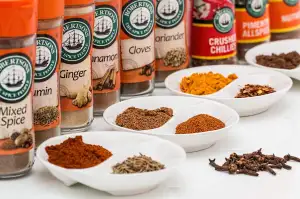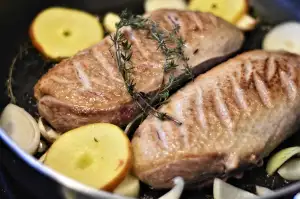Discover the Best Shallot Substitutes: Elevate Your Culinary Adventures with these Flavorful Alternatives!

Shallots, with their unique flavor profile, are a beloved ingredient in many culinary creations. However, there may be times when you find yourself without this essential ingredient. Fear not! There are several flavorful alternatives that can elevate your dishes to new heights. In this article, we will delve into the world of shallot substitutes and discover how they can enhance your culinary adventures. Whether you're looking for a milder option or a fresh twist, these alternatives will surely impress your taste buds. So let's embark on this flavorful journey and explore the best shallot substitutes together!
Why Look for Shallot Substitutes?
While shallots are known for their unique flavor profile, there are several reasons why one might need to find a substitute. Firstly, shallots can be quite expensive and may not always be readily available. Secondly, some individuals may have allergies or sensitivities to shallots, making it necessary to find alternatives. Lastly, exploring different substitutes can add variety and excitement to your culinary creations, allowing you to experiment with new flavors and textures. So whether you're looking for a cost-effective option or simply want to try something different, discovering the best shallot substitutes is a worthwhile endeavor in your culinary adventures.
Onion: A Versatile Alternative to Shallots
When it comes to shallot substitutes, one of the most readily available options is the humble onion. With its distinct flavor profile, onions can add depth and complexity to your dishes, just like shallots.
Onions come in various types, such as red, white, and yellow, each with its own unique taste. Red onions tend to be milder and slightly sweeter, while white and yellow onions have a stronger and more pungent flavor.
To use onions as a substitute for shallots, simply chop them finely or slice them thinly. Keep in mind that onions are generally stronger in flavor than shallots, so you may want to use a smaller amount initially and adjust according to your taste preferences.
Whether you're sautéing them for a stir-fry or caramelizing them for a rich sauce, onions can bring a similar depth of flavor to your dishes as shallots. They also offer the added benefit of being more widely available and less expensive than shallots.
Next time you find yourself without shallots in your pantry, don't hesitate to reach for an onion instead. It's a versatile alternative that can elevate your culinary creations with its distinct taste and aroma.
Garlic: Adding Depth and Flavor to Your Dishes
Garlic, with its pungent and distinctive flavor, is a fantastic alternative to shallots in cooking. It adds depth and richness to dishes, enhancing the overall taste profile. Whether used raw or cooked, garlic brings a unique aroma and complexity to your culinary creations. Its versatility allows it to be used in various cuisines, from Italian pasta sauces to Asian stir-fries. Just like shallots, garlic can be minced, sliced, or crushed depending on the desired intensity of flavor. So if you're out of shallots, don't hesitate to reach for this flavorful substitute!
Leeks: A Milder Option for Shallot-Lovers
Leeks, with their mild and slightly sweet flavor, make an excellent substitute for shallots. These long and slender vegetables belong to the same family as onions and garlic, but they offer a milder taste that is perfect for those who enjoy the subtleness of shallots. Leeks can be used in various dishes, including soups, stews, stir-fries, and even salads. Their delicate flavor adds depth to your dishes without overpowering other ingredients. So if you're a shallot-lover looking for a milder option, give leeks a try and elevate your culinary adventures!
Scallions: Providing a Fresh and Onion-like Taste
Scallions, also known as green onions or spring onions, are another excellent substitute for shallots. They have a fresh and onion-like taste that can elevate your dishes to new heights. Scallions are milder than shallots, making them a great choice for those who prefer a more subtle flavor.
These vibrant green vegetables can be used in both raw and cooked dishes. When using scallions as a substitute for shallots, you can chop them finely and add them to salads, salsas, or garnishes. Their mild flavor will complement the other ingredients without overpowering them.
In cooked dishes, scallions can be sautéed or stir-fried to bring out their natural sweetness. They work well in Asian-inspired recipes such as stir-fries, noodle dishes, and soups. The green parts of scallions can also be used as a garnish to add a pop of color and freshness to your finished dish.
One advantage of using scallions as a shallot substitute is that they are readily available in most grocery stores year-round. They are also budget-friendly and versatile, making them an excellent option for experimenting with different flavors in your culinary adventures.
Whether you're making a savory sauce, a flavorful stir-fry, or a refreshing salad dressing, scallions can provide the fresh and onion-like taste that shallots bring to your dishes. So next time you run out of shallots or simply want to try something new, reach for scallions and let their vibrant flavor enhance your culinary creations!
Chives: Delicate and Aromatic Substitute for Shallots
Chives are a fantastic substitute for shallots when you're looking for a delicate and aromatic flavor. These slender green herbs belong to the same family as onions and garlic, but they offer a milder taste that won't overpower your dishes. Chives have a subtle onion-like flavor with a hint of garlic, making them an excellent choice for adding depth to your recipes.
You can use chives in both raw and cooked dishes. When using them raw, simply chop them finely and sprinkle them over salads, soups, or creamy dips to add a burst of freshness. Chives also work well as a garnish for omelets or scrambled eggs, providing a pop of color and flavor.
In cooked dishes, chives can be added towards the end of the cooking process to preserve their delicate taste. They pair beautifully with seafood, such as grilled fish or shrimp scampi. You can also mix chopped chives into mashed potatoes or creamy pasta sauces for an extra layer of flavor.
One advantage of using chives as a shallot substitute is their availability throughout the year. While shallots may be harder to find in some regions or during certain seasons, chives are often readily available in grocery stores or can even be grown in your own herb garden.
So next time you find yourself without shallots, don't hesitate to reach for chives instead. Their delicate and aromatic nature will elevate your culinary creations and provide a satisfying alternative to shallots. Experiment with different dishes and let your taste buds guide you on this flavorful adventure!
In conclusion, exploring shallot substitutes can open up a world of culinary possibilities. Whether you choose to use onions, garlic, leeks, scallions, or chives, each alternative brings its own unique flavor and aroma to your dishes. By experimenting with these substitutes, you can elevate your cooking and add depth to your recipes.
Don't be afraid to get creative in the kitchen and try different combinations of shallot substitutes in your favorite recipes. You may discover new flavors and textures that will surprise and delight your taste buds. So go ahead, embark on a flavorful journey and let these substitutes enhance your culinary adventures!
Published: 22. 11. 2023
Category: Food



